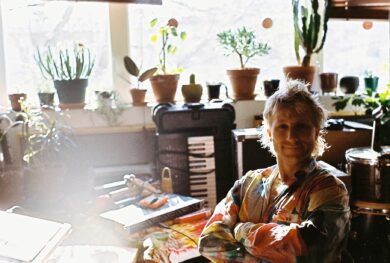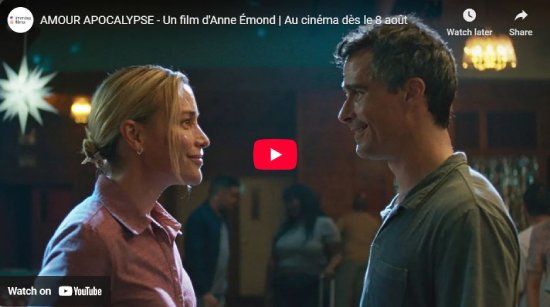With his recent score for director Anne Émond’s Peak Everything (Amour Apocalypse, in French), Christophe Lamarche-Ledoux has emerged as one of the Québec film industry’s most prolific and original composers. Meet a composer driven by sound, and guided by the images in his mind.
Like Molière’s Monsieur Jourdain, who unknowingly spoke in prose, Christophe Lamarche-Ledoux has always composed film music, even when he wasn’t.
 After studying jazz in Cégep, the young sax player – a devout John Coltrane disciple – began broadening his horizons, diving into rock and electronic music, with Radiohead and Daft Punk as his entry points. Inspired by his new influences, which now also included the krautrock of bands like Can and Neu!, he created the multidisciplinary project Organ Mood, alongside visual artist Mathieu Jacques. They were later joined by Mathieu Charbonneau (Avec pas d’casque) and Estelle Frenette-Vallières (Les Louanges, Chocolat).
After studying jazz in Cégep, the young sax player – a devout John Coltrane disciple – began broadening his horizons, diving into rock and electronic music, with Radiohead and Daft Punk as his entry points. Inspired by his new influences, which now also included the krautrock of bands like Can and Neu!, he created the multidisciplinary project Organ Mood, alongside visual artist Mathieu Jacques. They were later joined by Mathieu Charbonneau (Avec pas d’casque) and Estelle Frenette-Vallières (Les Louanges, Chocolat).
Although Lamarche-Ledoux is essentially self-taught in the craft of scoring, he’s spent a great deal of time reflecting on the nature of his work as a screen composer. “For me, music needs to have enough space for people to bring in their own thoughts while they’re listening,” he says. “When I was composing for Organ Mood, I always kept in mind that the music would be paired with projections, and I quickly realized that if the music stands on its own, if I deliberately make it interesting enough, quote unquote, and it doesn’t need anything else to exist, it means I did too much.”
This likely explains why Lamarche-Ledoux’s minimalist approach has proven so compelling to filmmakers – beginning with Stéphane Lafleur, also a compose,r and member of Avec pas d’casque, with whom he shares a distinct artistic kinship. “Stéphane had already done a good part of the editing for Tu dors Nicole using Organ Mood tracks,” says the screen composer. “At some point, he just reached out and asked me to fill in the gaps!”
Since then, the two artists have expanded their collaboration to other films (including Viking) and have also formed a duo called Feu Doux, through which Lamarche-Ledoux is exploring ambient music for the first time. “We’d been looking for a joint musical project for a while, and we developed a kind of epistolary workflow, ping-ponging audio files back and forth. Our goal was to make music that helps people sleep, so it was essential not to overdo it,” he says.
Favouring independent filmmakers, Lamarche-Ledoux has also developed a strong creative bond with director Matthew Rankin. Thanks to Sylvain Corbeil, who produced Universal Language (Une Langue Universelle) – a Cannes-awarded film and the composer’s second collaboration with Rankin after the unclassifiable The Twentieth Century – he joined Anne Émond’s production of Amour Apocalypse, a film that was also selected for the Directors’ Fortnight at the Cannes Film Festival.
“I didn’t know Anne’s work at all, and I discovered a wonderful human being,” he says. “We immediately clicked. To my surprise, she was very familiar with my work, and I found out she had created her film while listening to Lesser Evil, my electronic duo with Ariane M., and Feu Doux. And yet it had never occurred to her to ask me to compose the score!”
Lamarche-Ledoux was on board before filming even began; a clear advantage, in his words, because some directors wait until the editing stage to commission the music. “It made me feel truly integrated into the creative process,” he says. “Even though composing is a pretty solitary task, working in film gives me the sense that I’m part of a collective creation. I don’t feel like the film ultimately belongs to the director alone; everyone involved shares a common desire to serve the film.
“The more I do it, the more it feels like my composer’s arm is growing, and I really want to see how far it can reach. I still enjoy performing live, but I can definitely see myself composing for film for years to come.”
